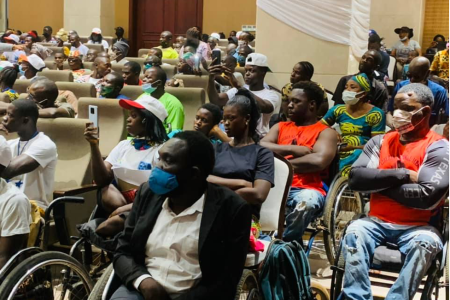Liberia: Panelists Calls Internet Inclusion for Persons with Disabilities

Panelists at the media roundtable discussion on persons living with disabilities (PWD), say in order for Liberia to achieve Sustainable Development Goals 8 and 10, access for the internet must be inclusive.
PWDs will be able to engage equitably and contribute significantly to the economy, according to Matthews T. Roberts, president of the internet Society Liberia chapter.
Under the theme ‘Transformative solutions for Inclusive development: the role of innovation fueling an accessible and equitable world', the annual observance of the International Day of Persons with Disabilities on 3 December was proclaimed in 1992 by the United Nations General Assembly resolution 47/3.
The purpose of the day is to increase awareness of disability issues and to rally support for the rights, dignity, and general welfare of people with disabilities.
According to Robert, who spoke on the topic ‘ ‘Digital Rights and Inclusion for PWD, people with disabilities are unable to utilize the majority websites, thus discriminating them.
"Everyone must be accessible to the service providers. As far as their human rights go "he stated.
In three different interactive discussions, the global issue of 2022—innovation for disability inclusive development in jobs and a fast evolving technological landscape for all—is the main topic. and how mainstreaming assistive devices in the workplace might improve accessibility to employment.
Robert added that Infrastructures and equipment should be accessible to PWDs in order for them to explore meaningfully to society. “No individual should be left over. We should be able to pull PWD over,” he said.
Liberia is among countries with a high population of people living with disabilities. According to borgenproject of those with disabilities 61% have a mobility disability, 24% are visually impaired, 7% are deaf, and 8% have an intellectual or psychosocial disability.
According to Elizabeth’s Legacy of Hope, 99% of the 48% in poverty in Liberia are those with disabilities.
Non-accommodating infrastructure and social attitudes based on stigmas play a large part in abolishing the disabled community in Liberia. Many cannot exercise the basic right to an education, leading then to unemployment
People living disabilities represent fourteen percent of the country’s population, according to the 2008 Housing and Population Census, continue to be marginalized, and with the fast growing digital population, PWDs are most likely to be excluded. Many websites and other digital platforms do not give access to people with disabilities.
Alonso Dixon, secretary general, National Union of Organizations of the Disabled (NUOD), calls for an inclusive media community in Liberia that allows the employment of PWDs while recommending more training with the media to educate them on appropriate names to call PWD.
Speaking on the topic ‘Media and CSOs partnership for Active Civic Engagement’, he said media institutions should be accessible to them, if they must fully participate. “We have some of our members who are first degree holders in communication.”
“We need an inclusive media,” he said.
Liberia established the National Commission on Disabilities in 2005, an organization focused on creating policies to aid disabled Liberian people.
In the 12th Session of the United Nations Conference of State Parties to the Convention on the Rights of People with Disabilities, Liberia announced that it adopted a National Action Plan for the Inclusion of Persons with Disabilities.
The goal of this plan was to promote the welfare and rights of the disabled in Liberia, while also aiming to include them in the governance process and provide them with financial assistance through social security. Liberia is also planning on including sign language as a required course from elementary school to college.
According to the WHO and World Bank, there are between 60 and 80 million people with disabilities (PwDs) living in Africa. The majority of them are unable to work or attend school because they are living in poverty. To safeguard and advance the human rights of disabled Africans, greater inclusion of them in all spheres of
The press union of Liberia's (PUL) president, Charles Coffey, urged journalists to emphasize the benefits of including people with disabilities rather than merely telling their sad stories. “Everyone of us, no one knows tomorrow.”
Last year under the inclusive media project, internews trained journalists from Monrovia and other parts to report on the positive impact of people living with disabilities. Journalists were trained and mentored in PWD reporting.
Jefferson Togba Mensah, internews Senior Media advisor, said they will continue to work and engage with journalists on the PWDs by continuously providing training to enhance their reporting. “We will also engage with AiFO, and our team of trained reporters for an inclusive media program,” he said.
In a special remark, the Inter-news Country Director, Lien Bach, said that the roundtable discussion was timely because it is very important intended to amplify the voices of PWDs across Liberia.
According to her, their mission is to support local journalists and media partners to publish accurate, balanced and credible stories about PWDs in their various media outlets in order to maximize the impact on PWDs and create awareness on topics of PWDs issues.
“I really wish all of you today a very good discussion about the PWDs Community,” she said.
